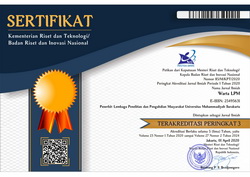Pemberdayaan Guru-Guru Bahasa Inggris SMP Kota Banjarmasin dalam Mengembangkan Soal Berbasis HOTS untuk Mengukur Kemampuan Membaca
DOI:
https://doi.org/10.23917/warta.v25i4.767Keywords:
Critical Thinking Skills, HOTS, Assessment, reading abilityAbstract
Having the ability to think critically is very important, especially for school-age teenagers who are still in the process of self-discovery and have not been able to sort out information. Teacher is an important figure in preparing students with critical thinking skills since teachers have a great opportunity to instill positive things that support the development of their students. That is why, it is important for teachers to be able to train their students to think critically and develop instruments that can measure students’ critical thinking skills. This activity aims to train teachers in developing instruments of critical thinking skills assessment in reading English texts. The method used is a participatory method in which emphasizing active participation of 35 teachers of English MGMP SMP in Banjarmasin. The implementation of this activity consists of delivering the material, evaluating the understanding of the material, assisting the compilation of questions, and analyzing question items. The findings show that 96% of the items compiled have met the standards of critical thinking assessment in the field of reading skills. In addition, more than 65% of the total items are formulated correctly according to the concept of assessment. This means that this activity has reached the target which 71% of the total participants scored more than equal to 6. It is concluded that the participants of the training have a good understanding of the concept of critical thinking assessment and are able to compile multiple choice questions based on critical thinking skills.
References
Changwong, K., Sukkamart, A., & Sisan, B. (2018). Critical Thinking Skill Development: Analysis of a New Learning Model for Thai High Schools. Journal of International Studies, 11(2), 37–48.
Damayanti, & Anando, A. A. (2021). Peran Guru dalam Menumbuhkembangkan Kemandirian Siswa Melalui Pembelajaran Inkuiri. Jurnal Sinestesia, 11(1).
Feronica, R. A., Apriani, A., & Edy, S. (2021). The Implementation of Higher Order Thinking Skills (HOTS) in Junior High School: Teaching Practice and Problems. English Franca: Academic Journal of English Language and Education, 5(2).
Jumariati, J., Amelia, R., & Elyani, E. P. (2021). Pengaruh Pembelajaran Berbasis Masalah terhadap Kemampuan Mahasiswa Kelas Advanced Writing pada Program Studi Pendidikan Bahasa Inggris FKIP ULM dalam Menulis Esai Ekspositori Bertema Lahan Basah.
Kosim, M., Hasan, N., Zahid, M., & Hasan, M. (2018). Materi Pembekalan KPM Partisipatoris: Pemberdayaan Masyarakat dengan Pendekatan ABCD dan PAR. LPPM IAIN Madura.
Pantiwati, Y. (2013). Authentic Assessment for Improving Cognitive Skills, Critical-Creative Thinking, and Meta-Cognitive Awareness. Journal of Education and Practice, 4(14), 1–9.
Retnawati, Djidu, H., Kartianom, K., Apino, E., & Anazifa, R. D. (2018). Teachers’ Knowledge about Higher Order Thinking Skills and Its Learning Strategy. Problems of Education in the 21st Century, 76(2), 215–230. https://doi.org/10.33225/pec/18.76.215
Retnawati, H., Hadi, S., & Nugraha, A. C. (2016). Vocational High School Teachers’ Difficulties in Implementing the Assessment in Curriculum 2013 in Yogyakarta Province of Indonesia. International Journal of Instruction, 9(1), 33–48. https://doi.org/10.12973/iji.2016.914a
Setyarini, S., Muslim, A. B., Rukmini, D., Yuliasri, I., & Mujianto, Y. (2018). Thinking Critically while Storytelling: Improving Children’s HOTS and English Oral Competence. Indonesian Journal of Applied Linguistics, 8(1), 189–197.
Susanti, A., Retnaningdyah, P., Ayu, A. N. P., & Trisusana, A. (2020). Improving Higher Order Thinking Skills through Collaborative Strategic Reading in Indonesia. International Journal of Asian Education, 1(2). https://doi.org/10.46966/ijae.v1i2.37
Szabo, Z., & Schwartz, J. (2011). The Use of Online Discussions to Improve Critical Thinking. Technology, Pedagogy, and Education, 20(1), 79–94.
Tanujaya, B., Mumu, J., & Margono, G. (2017). The Relationship Between Higher Order Thinking Skills and Academic Performance of Students in Mathematics Instruction. International Education Studies, 10(11). https://doi.org/10.5539/ies.v10n11p78
Taubah, M. (2019). Penilaian HOTS dan Penerapannya di SD/MI. Elementary, 7(2), 197–214.
Tim Dirjen GTK. (2019). Buku Pegangan Pembelajaran Berorientasi pada Keterampilan Berpikir Tingkat Tinggi. Kementerian Pendidikan dan Kebudayaan.
Tyas, M. A., Nurkamto, J., Marmanto, S., & Laksani, H. (2019). Developing Higher Order Thinking Skills (HOTS) Based Questions: Indonesian EFL Teachers’ Challenges. Proceeding of the 2nd International Conference on Future Education, 2(1), 52–63. https://doi.org/10.17501/26307413.2019.2106
Downloads
Submitted
Accepted
Published
How to Cite
Issue
Section
License
Copyright (c) 2022 Warta LPM

This work is licensed under a Creative Commons Attribution 4.0 International License.















